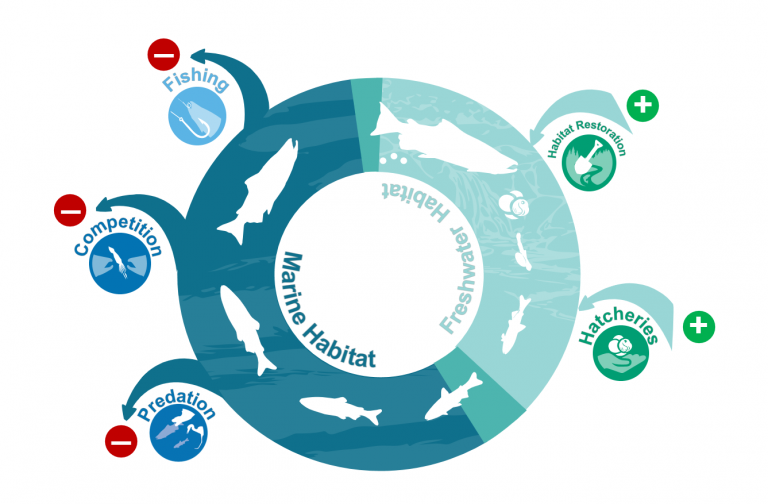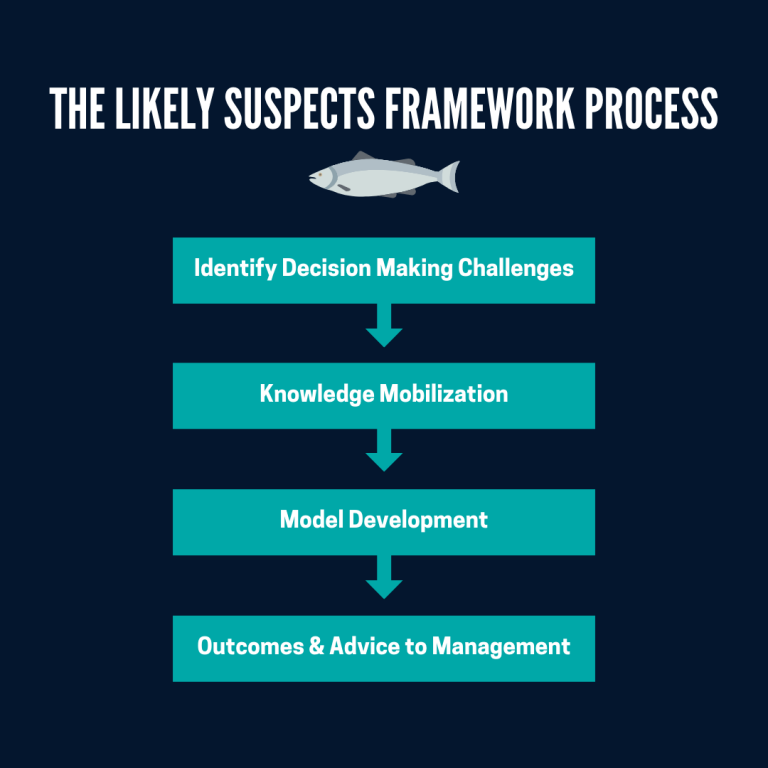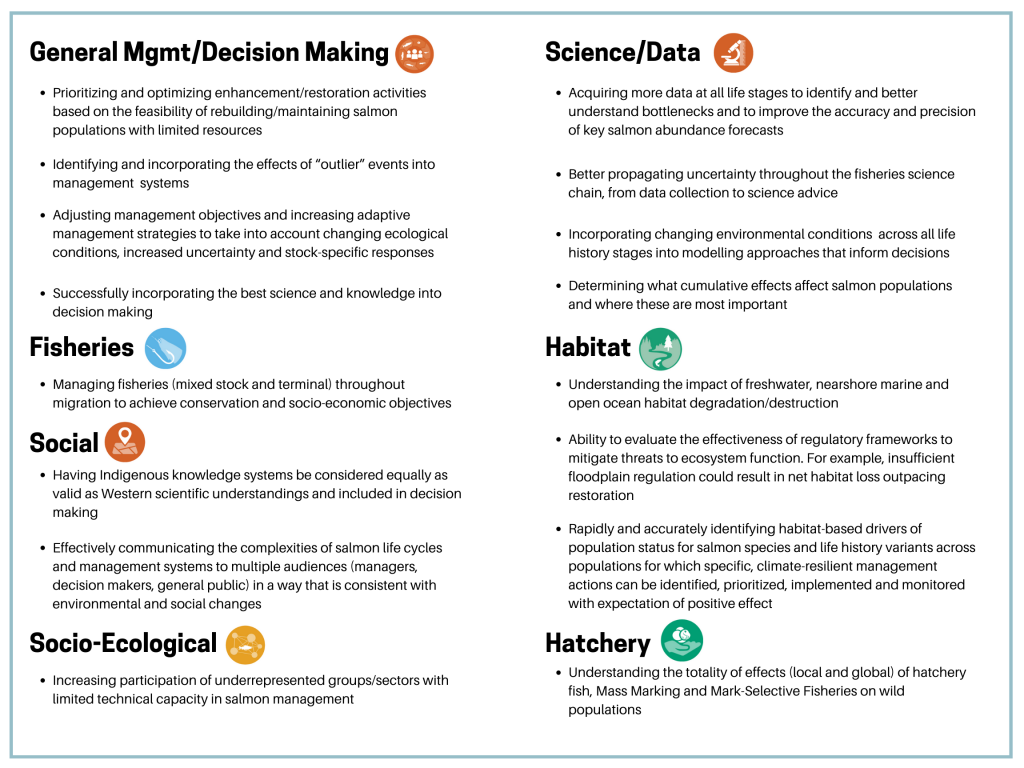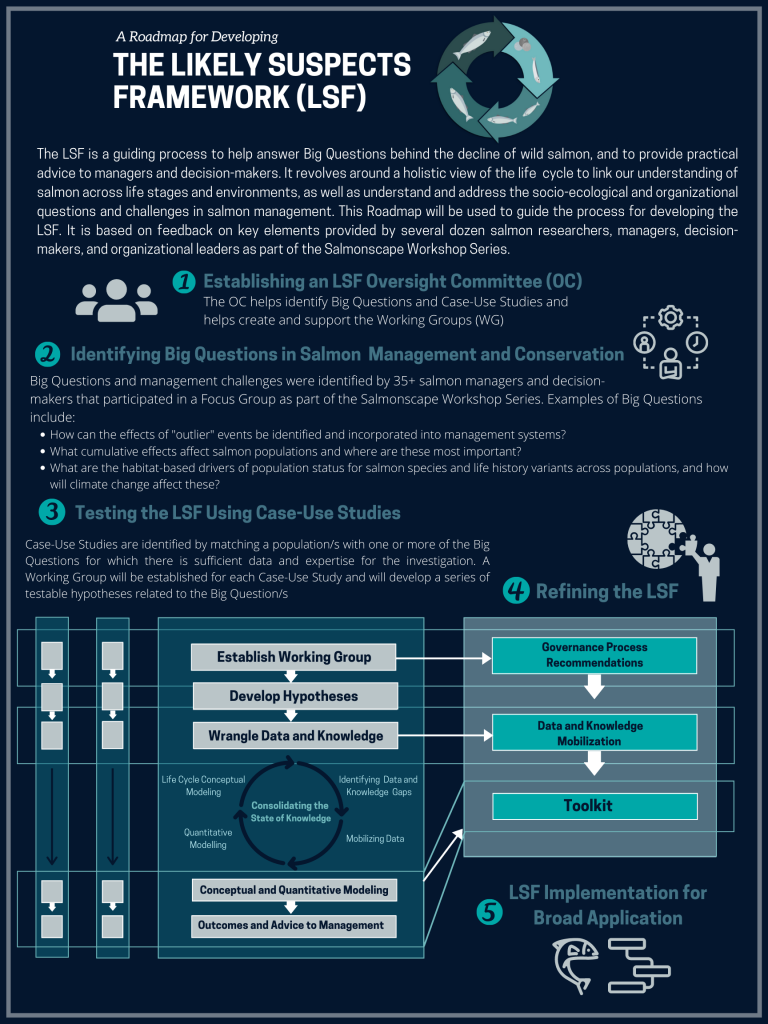The Likely Suspects Framework
Photo credit: Jonny Armstrong
The Likely Suspects Framework
In recent decades, salmon across the North Pacific and North Atlantic Ocean basins have experienced widespread declines in abundance and productivity. Climate change has emerged as an overarching driver of these trends. The effective management of salmon in the context of their associated ecosystems requires an understanding the cumulative impact of the drivers of salmon survival across life history stages. A holistic life cycle approach will inform annual forecasts, recovery planning, and management strategy evaluations to support resource management decisions and climate change risk assessments. The Likely Suspects Framework (LSF) concept was proposed in 2017 by a group of salmon researchers from the Atlantic and the Pacific basins, as such a process with the goal of providing practical advice to managers and decisionmakers by identifying the main sources of salmon mortality and their cumulative effects across the life cycle of a salmon population of interest.

The LSF process begins with the identification of the main sources of salmon mortality (i.e., the “likely suspects”) by bringing together Indigenous knowledge, local knowledge, and Western science in order to account for the observed reductions in salmon returns. Subsequently a relatively simple conceptual model linking effects across life history stages could then be used to inform management advice and decision support tools.
The Salmonscape Workshop Series was developed as phase one of the LSF implementation in the Northeast Pacific, with the objective of developing a roadmap to guide the process for developing Case-Use Studies (specific salmon populations/watersheds) to test and further define the LSF for future implementation. The workshop series brought together over 100 participants representing a diverse range of roles and expertise, from federal and provincial/state agencies, Indigenous governments and communities, NGOs, and academic institutions.
The Salmonscape Workshop Series was funded by the Pacific Salmon Commission’s Southern Endowment Fund.

A Focus Group for Salmon Challenges
The Salmonscape Workshop Series began with a Focus Group designed to identify the most significant scientific, management and decision-making challenges related to salmon in the Northeast Pacific. These challenges reflect the questions that the LSF will ultimately have to address and should be the subject of subsequent case studies to test the robustness of the process. The expertise and scope of decision-making in the Focus Group included fisheries managers, hatchery managers, habitat managers, organizational leadership, individuals with Western science backgrounds, and Indigenous Knowledge-holders. In total, participants submitted over 100 challenges which have been reduced to 16 key challenges faced by managers and decision makers.
Identifying Big Questions and Challenges
When developing the Salmonscape Workshop Series, the Planning Team advised to start by reaching out to managers and decision makers. The rationale for this was that it is critical to first understand the Big Questions and challenges managers, decision-makers, and organizational leaders are presently grappling with, and that their feedback would help us develop the context for the subsequent workshops.
The complex life history of salmon greatly complicates our ability to understand important drivers of mortality. As salmon grow and migrate, their competitors, prey, and predators change, and their ability to compete and evade predation is influenced by the physical environment. There are many candidate factors that are thought to influence the survival and success of salmon in different environments. However, our understanding of these factors is limited by the questions we ask and the information we can readily obtain. The LSF is meant to help us link freshwater, estuarine and marine domains, and understand how carry-over effects may also play an important role in understanding salmon mortality.
The LSF may assist management by promoting the steps needed to consider cumulative and/or non-linear effects, focus on current unknowns by quantifying uncertainty and considering alternative hypotheses, and improve communication.
16 Challenges

Establishing an LSF oversight committee...
Success of the LSF requires effective governance engaging organizations and individuals associated with all aspects of process across the spectrum of scientists, decision-makers and those affected by decisions. The LSF OC will identify Case-Use Studies that match appropriate focal populations/stocks with the appropriate Big Questions and ensure that there is sufficient information and expertise to conduct the Case-Use Study. The LSF Oversight Committee (OC) will be composed of qualified individuals from government agencies, Indigenous communities and Nations, academia, and other organizations. The primary responsibility of members is to champion the development of the LSF in such a way that it is relevant to the needs of the organizations they represent and to ultimately promote its uptake. The OC will identify the Working Groups (WGs) that will implement each Case-Use Study and support the WGs as needed. The OC will also support WGs by helping secure funding, and advising on governance considerations, processes, and tools. These can help to identify population bottlenecks, knowledge, data mobilization and data sharing considerations and approaches that are able to use multiple knowledge types (e.g., Two-Eyed Seeing) to more fully address Big Questions.
Testing the LSF using case studies...
Individual Case-Use Studies will involve focal populations/stocks with their relevant Big Question/s and be used to pilot the development of the LSF. A Working Group will be formed for each Case-Use Study and will focus on a population or stock (or set of populations/stocks), for which sufficient information and expertise exist. The Studies will be driven by several key elements that include Working Group governance, development of hypotheses related to the Big Questions, defining the set of processes to identify population bottlenecks, consolidating the State of Knowledge (SoK) and conducting modeling exercises, and communicating results and advice to decision-makers. Consolidating the SoK will likely be an iterative process that involves bringing together Indigenous knowledge, local knowledge, and Western scientific knowledge, developing conceptual life cycle models, identifying data needs and data gaps, wrangling data, assembling relevant quantitative models, and performing analyses. Completing an iteration of the SoK consolidation cycle may lead the Working Group to revisit and update components of the SoK and perform a new set of analyses. The lessons learned from each Case-Use Study will help the OC develop a broader set of recommendations on governance, data/knowledge sharing, and modeling approaches. These tools will provide decision-support services for managers and decision-makers and provide broad recommendations and templates for communications products that can be used in the broad application of the LSF.
Implementing the LSF...
Implementation of the LSF will be reliant on lessons learned from each of the Case-Use Studies. There are several important challenges related to the implementation of the LSF, including bringing the LSF to data limited systems (which will be a challenge for supporting process type models), buy-in from partners/stakeholders, the inherent complexity and scale across salmon life histories, and the uncertainty around key pieces of information (e.g., hatchery effects, ocean survival, future environmental conditions). Wide implementation of sophisticated models as envisioned within the LSF likely requires development of a new set of tools, whereby individual model components can be integrated and customized to unique situations. There will be a need to effectively incorporate non-salmon information into analyses (e.g., marine environment and pelagic fisheries surveys, ecosystem surveys). Different regions within the sphere of the LSF will undoubtedly have their own set of implementation challenges and the different tools that may be developed will only be somewhat generalizable between regions. Therefore, developing flexibility around data inputs and supporting analyses will be a key element of successful LSF implementation
The Likely Suspects Framework Roadmap
The Likely Suspects Framework Roadmap was developed to guide the process for developing the Case-Use Studies to test and further define the LSF. The Roadmap was created based on feedback provided by dozens of participants, including salmon researchers and scientists, managers, knowledge-holders, decision-makers, and organizational leaders as part of the Salmonscape Workshop Series.

Partners:


